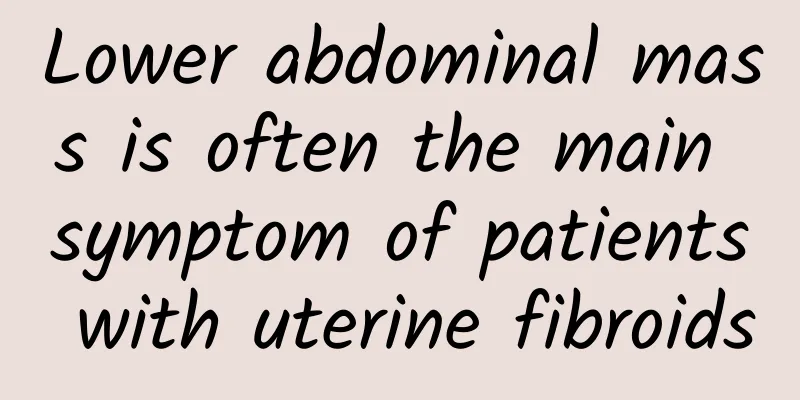Are uterine fibroids serious? What should I do?

|
Whether uterine fibroids are serious depends on the specific situation. If there are no symptoms, you can observe them temporarily; if there are obvious symptoms, surgical treatment may be required. 1. Understand the prevalence of uterine fibroids: Uterine fibroids are common benign tumors in women. About half of women will develop uterine fibroids at some stage in their lives. Although it sounds common, it does not mean that every uterine fibroid is dangerous. Most women may not even know that they have uterine fibroids because they usually do not cause obvious symptoms. 2. Asymptomatic treatment: If you are diagnosed with uterine fibroids but do not have any symptoms, then surgery is usually not needed immediately. Your doctor will recommend regular monitoring, generally every six months, to ensure that the fibroids are not growing or causing other problems. This observational management approach can avoid unnecessary surgery and related risks. 3. Treatment of symptomatic uterine fibroids: When uterine fibroids cause obvious symptoms, such as anemia, menorrhagia, frequent urination, or constipation, further treatment should be considered. Especially when fibroids compress the bladder or rectum, resulting in a decrease in quality of life, surgery may be a necessary option. If uterine fibroids are identified as one of the causes of infertility, surgical treatment may also be the key to solving the problem. 4. Surgical treatment options: For patients with uterine fibroids who need surgery, there are several different surgical options available. Traditional open laparotomy is an option, but in recent years, minimally invasive surgeries such as laparoscopy and robot-assisted surgery have become more common, with less trauma and faster recovery. The specific surgical method to choose needs to be determined based on the size and location of the fibroids and the specific situation of the patient. 5. Postoperative care and follow-up: Postoperative care is equally important. Follow the doctor's advice and have follow-up on time to ensure that the fibroids do not recur or have other complications. During the postoperative recovery period, proper rest, avoid heavy physical labor, and maintain good living habits will help restore health. 6. Lifestyle adjustments: In addition to surgery and observation, maintaining a healthy lifestyle can also help manage uterine fibroids. A balanced diet, moderate exercise, and avoiding excessive stress all contribute to maintaining overall health and may help prevent and relieve the symptoms of uterine fibroids. 7. Pay attention to mental health: The diagnosis and treatment of uterine fibroids may bring certain psychological pressure to women. Sharing with family and friends, seeking psychological support, or consulting professional psychology are all good ways to cope with it. Maintaining a positive attitude will help to better face and deal with the disease. Whether uterine fibroids are serious depends mainly on whether they cause obvious symptoms and affect the quality of life. Asymptomatic fibroids can be observed and reviewed regularly; symptomatic fibroids require active treatment, including surgery and postoperative care. Maintaining a healthy lifestyle and a good mental state also play an important role in the management and prevention of uterine fibroids. |
<<: What causes chronic cervicitis?
>>: What are the consequences of not removing a large uterine fibroid?
Recommend
What are the dangers of ovarian cysts
Ovarian cysts may cause reproductive health probl...
Recommended 6 ways to eat sweet potatoes to lose weight without going hungry
Sweet potatoes are not a "landmine food"...
Can patients with bacterial vaginosis have sexual intercourse? How is bacterial vaginosis transmitted?
The appearance of bacterial vaginosis makes many ...
What is the success rate of threatened miscarriage?
What is the success rate of threatened abortion a...
What factors cause cervical hypertrophy?
The phenomenon of cervical hypertrophy is very co...
What is vaginitis?
What is vaginitis? 1. Long-term use of contracept...
How to diagnose acute pelvic inflammatory disease or chronic pelvic inflammatory disease
How to diagnose acute pelvic inflammatory disease...
People should always pay attention to the care methods of uterine fibroids
Uterine fibroids are a common disease among women...
How to treat functional amenorrhea
How is functional amenorrhea treated? Patients wi...
Not paying attention to menstrual hygiene may cause adnexitis
Not paying attention to menstrual hygiene may cau...
The causes of dysmenorrhea vary greatly among women of different ages
The causes of dysmenorrhea symptoms vary greatly ...
Understand the main manifestations of 3 types of vaginitis
Vaginitis is an inflammation of the vaginal mucos...
To treat vulvar leukoplakia, you must be prepared to fight a "protracted war"
What are the symptoms of vulvar leukoplakia? Beca...
What are the early symptoms of uterine fibroids?
What are the early symptoms of uterine fibroids? ...
Get rid of your belly in spring with ultrasonic body sculpting, a new magic weapon
As the temperature gradually rises in spring, man...









